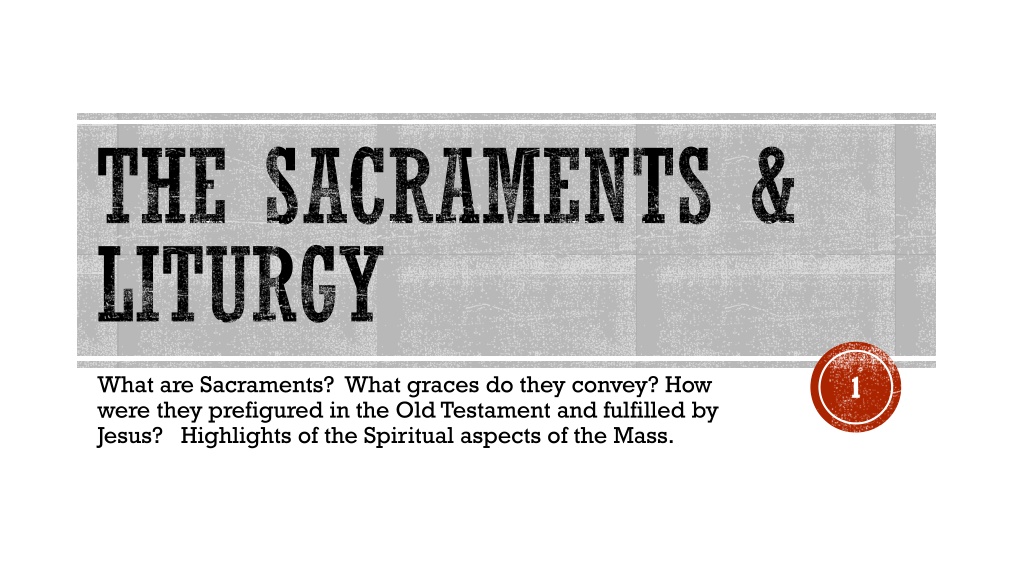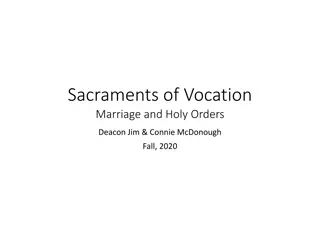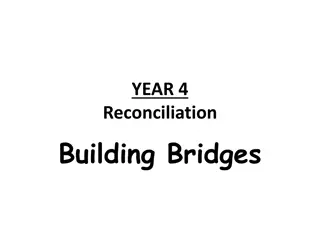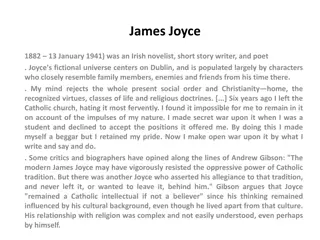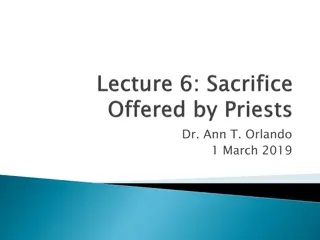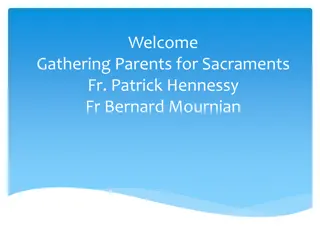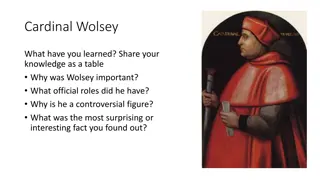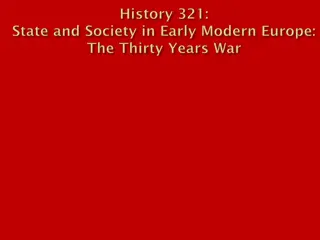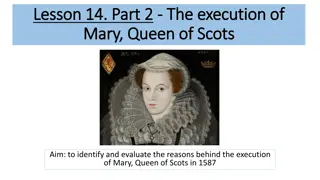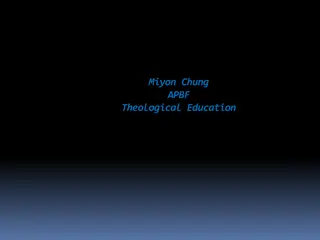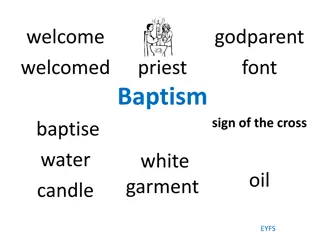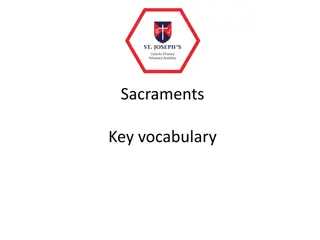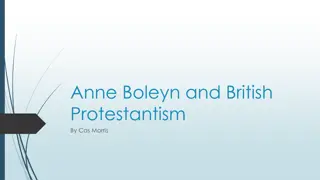Understanding the Sacraments and Sacramentals in Catholicism
Sacraments are efficacious signs of grace instituted by Christ, conveying divine life and enabling encounters with Jesus. They were prefigured in the Old Testament and fulfilled by Jesus. Sacramentals, sacred signs, dispose believers for sacraments and help in spiritual focus. Mass highlights the spiritual aspects of the Catholic faith.
Download Presentation

Please find below an Image/Link to download the presentation.
The content on the website is provided AS IS for your information and personal use only. It may not be sold, licensed, or shared on other websites without obtaining consent from the author. Download presentation by click this link. If you encounter any issues during the download, it is possible that the publisher has removed the file from their server.
E N D
Presentation Transcript
THE SACRAMENTS & LITURGY 1 What are Sacraments? What graces do they convey? How were they prefigured in the Old Testament and fulfilled by Jesus? Highlights of the Spiritual aspects of the Mass.
WHAT ARE SACRAMENTALS? Sacred signs which resemble the spiritual effects of the sacraments. (CCC 1667) Sacramentals dispose believers to receive the chief effects of the Sacraments Sacramentals include: Blessings at meals, consecrations to God Specific actions processions, the sign of the cross Prayers and devotions the Rosary Objects holy water, ashes, candles, medals We are a society of signs and symbols sacramentals help us to remain focused on our spirituality in a concrete way 2
WHAT ARE SACRAMENTS? Efficacious signs of grace instituted by Christ and entrusted to the Church by which the divine life is dispensed to us (CCC 1131) They are effective signs and symbols of actual grace conveyed to us by Jesus through His Church Sacraments convey divine life and enable us to encounter Jesus in a tangible way when we respond, we draw closer to Him Respecting the nature that God gave us, He uses material things to accomplish spiritual purposes They are not merely man-made gestures they actually convey grace from Jesus through the power of the Holy Spirit 3
WHAT ARE SACRAMENTS? Jesus instituted every Sacrament and entrusted them to the Church Sacraments are necessary for our salvation the fruit of the sacramental life is that the Sprit of adoption makes the faithful partakers of the divine nature (CCC 1129) The sacraments convey grace and are integral to our sanctification a key part of our ongoing conversion to Christ Sacraments communicate a participation in God s life and help us grow in love of God and neighbor. 4
WHAT ARE SACRAMENTS? Three Sacraments of Initiation: Baptism Confirmation provide the foundation for Christian life Eucharist Two Sacraments of Service: Marriage and Holy Orders Two Sacraments of Healing: Penance and Reconciliation and Anointing the Sick and the Dying 5
THE SACRAMENT OF BAPTISM Immersion or bath immersion = sign of death and rising to new life in Christ Col 2:12 You were buried with him in baptism, in which you were also raised with him through faith in the power of God, who raised him from the dead. Bathing = cleansing from ALL sin, purification Baptism = gateway to the Christian life open the door to Christ and close the door to sin First Sacrament of Initiation and includes various sacramentals including water, oil, blessings, candle, white garment, and exorcism prayers 6
THE SACRAMENT OF BAPTISM Baptism prefigured in the Old Testament and fulfilled by Jesus: Noah and his family were saved from death by water in the ark (Gen 7:1-8:19) The Israelites were saved from Pharaoh by God s miraculous parting of the waters (Ex 14:10-30) Joshua led the Israelites into the Promised Land by parting the waters of the Jordan River (Joshua 3: 7-17) Baptism instituted by Christ Jesus Himself was baptized at the start of His public ministry the waters did not purify Him, rather He purified the water for eternity. Jesus did not need to be baptized. He was without sin, but demonstrated solidarity with humans to reconcile them with the Father. Jesus requires baptism: Mt 28:19-20 7
THE SACRAMENT OF BAPTISM Baptismal rite includes: Pouring of water or immersion three times with these words: I baptize you in the name of the Father, and of the Son, and of the Holy Spirit. Anointing with Sacred Chrism signifies the Holy Spirit Receiving the white garment and the candle signifies new life & being a new light to the world Normally done by priest or deacon but anyone can baptize in times of necessity with the required intention, water, and the Trinitarian formula (See Mt 28:19-20) Once in lifetime experience with renewal of baptismal promises 8
THE SACRAMENT OF BAPTISM The effects of baptism include an abundance of grace: Forgiveness of ALL sins original sin and personal sin = new life We become adopted children of God We are initiated into the Church and bonded to other Christians We receive the baptismal character sealed with indelible mark signifying that we belong to Christ. This mark is indelible no sin can remove it, but sin can prevent us from receiving the fruit of salvation. 9
THE SACRAMENT OF CONFIRMATION Necessary to complete baptismal grace by binding the baptized more perfectly to the Church and enriching them with a special strength of the Holy Spirit (CCC 1285) The baptized becomes sealed with the Holy Spirit and strengthened for service to the Body of Christ The baptized has a greater obligation to faithfulness in defending the Church and evangelizing others to bring them to Christ Jesus imparted the Holy Spirit on His disciples (Jn: 20:22) The Holy Spirit came upon the disciples at Pentecost inspiring them to proclaim and baptize 3,000 converts that day (Acts 2) 10
THE SACRAMENT OF CONFIRMATION Confirmation was prefigured in the Old Testament and fulfilled by Jesus Laying on of hands and anointing were signs of appointment to special offices Nm 27:23: Joshua is anointed as Moses successor Lv 21:10: the anointing of Levitical priests 1 Sam 10:1: Samuel anoints Saul as king 1 Sam 16:13: Samuel anoint David king after Saul s disobedience Is 11:2 and Daniel 9:25: prophesy of the anointed Messiah Jesus fulfilled the prophesy and was anointed at His baptism by the Holy Spirit who descended on Him in the form of a dove (Mt 3:16-17, Mk 1:10-11) The Rite of Confirmation includes: The imposition (laying on) of hands and anointing with Sacred Chrism Prayer to be sealed with the Holy Spirit and intercession of the Saints 11
THE SACRAMENT OF CONFIRMATION The effects of the Sacrament (CCC 1303): An indelible spiritual mark on the soul. Like baptism, is only given once The grace given at baptism is matured, increased, and made deeper We become more fully children of God, more firmly united and configured to Christ Our bond to the Church is perfected and we become her defenders The gifts of the Holy Spirit are strengthened and perfected - wisdom, understanding, knowledge, counsel, fortitude, piety, fear (reverent awe) of the Lord (Is 11:1-3) We are strengthened against sin and the fruits of the Holy Spirit are strengthened We are strengthened for Christ s mission to evangelize and defend the faith Confirmations are done primarily by the Bishop and in some instances by a priest 12
THE SACRAMENT OF EUCHARIST The Eucharist is truly the body, blood, soul, and divinity of Jesus the Father s ultimate gift of love. We must eat His flesh and drink His blood if we are to live forever. In receiving the Eucharist, believers come into intimate union with their Lord and Savior The Eucharist is our spiritual food that sustains us and strengthens us to live a Christian life The Eucharist was prefigured in the Old Testament and fulfilled by Jesus Ex 12:1-20: the Passover lamb Ex 16:2-16: feeding the Israelites with manna from heaven 13
THE SACRAMENT OF THE EUCHARIST Fulfillment by Jesus: Jn 6:25-58: the Bread of Life Discourse we must eat His flesh and drink His blood to have everlasting life This is NOT symbolic most of Jesus disciples deserted Him afterwards and He did not stop them from leaving. The Israelites found this very objectionable. Examine the context nothing indicates this was a parable or symbolic, the Greek verb trogo eat means to gnaw slowly. Consider 1 Cor 11:27: Whoever, therefore, eats the bread or drinks the cup of the Lord in an unworthy manner will be guilty of profaning the body and blood do the Lord. This is a direct reference to Jesus actual body not a symbolic reference to the Body of Christ 14
THE SACRAMENT OF THE EUCHARIST Jesus instituted the Eucharist at the Last Supper (Mt 26:26-28, Mk 14:22-24, Lk 22:17-20) Jesus commanded His disciples to celebrate the Eucharist as a memorial to Him How this happens: The priest, in persona Christi, calls upon the power of the Holy Spirit and says the words of consecration: this is my body and this is my blood. The substance (bread and wine) remain the same but the accidents, i.e., its true essence or nature, changes to the Body and Blood of Jesus (Consider that water remains water even though it becomes steam or ice) Called transubstantiation - the substance is literally transformed by the power of the Holy Spirit This is not consubstantiation where the body and blood of Jesus coexist with bread and wine 15
THE SACRAMENT OF EUCHARIST Jesus is entirely present in both the consecrated bread and wine His is present in each fragment and each drop Liturgy is re-presentation of the original Paschal sacrifice The Eucharist is the same Jesus who gave His body and blood on the cross, ever present to the Father as the perfect lamb of sacrifice slain for our sins Christ is not sacrificed again at Mass, we participate in the one sacrifice at Calvary that is ever-present in eternity, made present to us in time through the priest and the power of the Holy Spirit (Kairos = time altered by grace) The Eucharist is the highest form of sacrifice, praise, and thanksgiving to the Father The Eucharist is a foretaste of heaven and is to be worshipped 16
THE SACRAMENT OF THE EUCHARIST The sanctifying effects of receiving the Eucharist include: Becoming more closely unite with Christ Being transformed in Him by receiving Him Grace within us is increased the Eucharist is our spiritual nourishment Our venial sins are forgiven and we are helped to avoid future sins Our love of God and others is strengthened and we are more committed to those in need 17
THE SACRAMENT OF PENANCE AND RECONCILIATION Sin separates us from God and deeply affects our souls. Through this sacrament, Jesus gives us hope in our call to holiness by forgiving our sins and restoring us to intimacy with Him. Reconciliation is prefigured in the Old Testament and fulfilled by Jesus: Lam 3:22-23 steadfast love of God, mercy that never ends, hope in the Lord Num. 5:6-7 shows the historical practice of publicly confessing sins, and making public restitution. (Also in Neh 9:2-3) 2 Sam. 12:14 even though the sin is forgiven, there is punishment due for the forgiven sin. David is forgiven but his child was still taken (the consequence of his sin). 18
THE SACRAMENT OF PENANCE AND RECONCILIATION Matt. 9:4-7; Mark 2:10, Luke 5:24 Jesus demonstrates authority to forgive sins on earth when He healed the paralytic man. Matt. 18:18 the apostles are given authority to bind and loose. Jesus also empowers the Apostles to forgive sins in Jn 20:22-23. This authority, through Apostolic succession, is given to priests today, who are in persona Christi. Reconciliation is a repeatable sacrament of healing The sacrament includes: The penitent s contrition and confession of their sin with the right intention The priest s prayer of absolution 19
THE SACRAMENT OF PENANCE AND RECONCILIATION Prior to confessing sins, the penitent conducts a thorough examination of conscience Perfect contrition: contrition that arises because of the love of God alone Imperfect contrition: contrition from fear of eternal punishment Grave, serious, or mortal sins must be confessed in kind and number mortal sin turns us away from God Confession of venial sins is not required but strongly recommended. Venial sin allows charity to subsist, but offends and wounds it (CCC 1855). 20
THE SACRAMENT OF PENANCE AND RECONCILIATION Receiving absolution sets us free from sin through the power Christ passed on to the Church Absolution takes away sin but does not remedy the disorders that sin caused Penance provides satisfaction or makes amends for our sins Penance is integral to our ongoing conversion and a life of holiness Effect of the sacrament: Sins are forgiven so the soul returns to a state of grace Reconciliation with God and His Church Growth in holiness through the sanctifying grace of the sacrament Strengthened against concupiscence (the desire to sin) 21
THE SACRAMENT OF ANOINTING THE SICK Anointing of the sick strengthens those who are ill or dying. The sacrament calls Christians to accept and welcome suffering in faith as essential to their growth in sanctity and to the Body of Christ Prefigured in the Old Testament and fulfilled by Jesus: God promises health to the Israelites if they obey His commandments (Ex 15:25-26) Prayer, repentance, and the care of physicians will heal you when sick (Sir 38:1-14) The suffering servant prophesy: He has born our grief and carried our sorrows. His suffering heals us. (Is 52:13-53:12) Jesus commissions the apostles who anoint the sick with oil and heal them (Mk 6:7- 13) Jesus lays hands on the sick and heals them (Lk 4:40) We are children of God & fellow-heirs with Christ, if we suffer with Him (Rom 8:15-17) 22
THE SACRAMENT OF ANOINTING THE SICK Jesus is the divine physician who came to heal sinners (Mk 2:17), the blind, deaf, sick and afflicted (Lk 4:16-21, Jn 9:1-41) The anointing of the sick is not restricted to those near death Given to one who is in danger of death from sickness or old age serious illness May be repeated if the person s condition worsens Anointing can be done before surgery Administered by a priest or bishop, laying on of hands, anointing with blessed Oil of the Sick on the forehead and hands Also included are the Sacraments of penance and Eucharist (viaticum for the journey home) Apostolic Pardon - full pardon and remission of sins for those preparing to die 23
THE SACRAMENT OF ANOINTING THE SICK The effects of anointing the sick: The hoped for effect: God willing, the person is physically healed Even if no physical healing, the primary effect is spiritual healing the gift of peace and courage to deal with the difficulties of a serious illness Consecrates the person to Jesus suffering Confers sanctifying grace strengthening, courage, healing of the soul and body Redemptive suffering Sin and sickness cause spiritual, physical, and emotional disturbance that can lead to sorrow, bitterness, and discouragement. Jesus did not come to banish suffering. Rather, He gave it meaning and invested it with redemptive power. Through redemptive suffering we are given the dignity to share in Jesus suffering for the sake of the Church. 24
THE SACRAMENT OF ANOINTING THE SICK Suffering is necessary for: Purification For holiness (Wis 3:1-7) Is a primary tool of the Holy Spirit to configure us to Christ (1 Pet 4:1-2) By performing corporal and spiritual works of mercy, we imitate Jesus the healer, and become more fully transformed in him by the power of the Holy Spirit Is anyone among you sick? He should summon the presbyters of the church, and they should pray over him and anoint him with oil in the name of the Lord, and the prayer of faith will save the sick person, and the Lord will raise him up. If he has committed any sins, he will be forgiven. (Jas 5:14-15) 25
THE SACRAMENT OF HOLY ORDERS The ministerial priesthood shares in Christ s priesthood through the Sacrament of Holy Orders This sacrament is primarily directed toward the salvation of others. Recipients grow in holiness though their service to others. Prefigured in the Old Testament and fulfilled by Jesus: Melchizedek offers bread and wine as thanksgiving (Gen 14:18-20) We need a mediator with God to make reconciliation possible (Ex 19:9-24) God the Father sent His Son as our savior and mediator (1 Tim 2:5) Jesus is THE high priest and our mediator (Heb 4:14-16) Jesus instituted the priesthood at the Last Supper when He instituted the Eucharist 26
THE SACRAMENT OF HOLY ORDERS Apostolic succession Jesus gave His authority to His apostles (Mt 16:13-19, Lk 10:16) Peter recognizes that the office of apostles must be carried on and, under the guidance of the Holy Spirit, they selected Methias to replace Judas (Act 1: 15-26) The apostles in turn pass on their authority to others called bishops (1 Tim 4:14) The sacrament is administered by bishops and includes Laying on of hands on the head of the ordained Prayer asking for the outpouring of the Holy Spirit and his gifts proper to the ministry Makes an indelible spiritual mark on the recipient Only baptized men may be ordained as priests or deacons Jesus and the apostles were men Mary held a special place of honor, but she never became one of the twelve Priests act in person Christi and therefore take on the role of Jesus priests are icons of Christ Priest reflect Christ the Bridegroom of the Church 27
THE SACRAMENT OF HOLY ORDERS The priesthood normally includes vows of celibacy which enables them to be totally committed to the Church s mission sacrificing their life for the salvation of souls Three degrees of Holy Orders: Deacons: proclaim the Gospel, preach, celebrate Baptisms, Matrimony, funerals Priest do all that Deacons do and, in persona Christi, consecrate the Eucharist during Mass, absolve sins (reconciliation) anoint the sick, and in certain circumstances, confirmation Bishops can confer all the sacraments they are successors of the apostles 28
THE SACRAMENT OF MATRIMONY God is the author of marriage and this vocation is written in the very nature of men and women because they are created in His image and likeness. Matrimony is called to reflect the self-donating love (kenotic love) of the inner life of the Trinity and Christ s nuptial relationship with His Church. Marriage is not a purely human institution. Prefigured in the Old Testament and fulfilled by Jesus: God creates man and women and commands them to be fruitful and multiply (Gen 1:26- 28) God creates women to be partners and helpmates to men, equal because of the same flesh and bone, and establishes the primacy of marriage (Gen 2:18-24) God is Israel s husband and steadfastly faithful to her (Is 54:1-14) God intends for his people to be united to Him in a spousal relationship of total intimacy (Hos 2:14-20) 29
THE SACRAMENT OF MATRIMONY Jesus attends a wedding at Cana and sanctifies marriage (Jn 2:1-10) Husbands and wives are to be subject to each other; they reflect the mystery of Jesus the Bridegroom and His bride, the Church (Eph 5:21-33) The purpose of the sacrament of matrimony is to strengthen and consecrate the marriage God is the transcendent third in the marriage relationship Matrimony is a sacrament of service to each other, their family, and the Church Matrimony requires free and unconditional consent before the Church who intend an indissoluble union, completely faithful, and open to new life A sacramental marriage becomes indissoluble once it is consummated Annulments determine that a marriage was attempted but did not occur before God 30
THE SACRAMENT OF MATRIMONY The spouses are ministers of the Sacrament of Matrimony They mutually confer upon each other Christ s grace by expressing their consent before the Church Effects of the Sacrament: The bond between the spouses is strengthened Grace perfects the love of the husband and wife, binding them together in fidelity, and helps them to welcome children. Christ is the source of this grace He works through the power of the Holy Spirit to strengthen their covenant promises, to bear each other s burdens with forgiveness and kindness, Marriage is a foretaste of the wedding feast of the Lamb 31
THE LITURGY Mass comes from the Latin word Missio to go forth to be the hands and feet of Christ The Mass is a form of worship where we proclaim God s greatness & our need for Him To adore God is to acknowledge Him as Creator, Savior, Lord & Master of everything that exists To acknowledge that God is love and His love and mercy is infinite To adore God is to humble yourself In the Mass, Jesus Himself comes to meet us in a unique way Jesus presents Himself to the Father on our behalf in the form of bread and wine 32
THE LITURGY Liturgy is the official worship of the Church on behalf of the faithful In Christian tradition it [liturgy] means the participation of people of God in the work of God. (CCC 1069) The liturgy is a foretaste of heaven In the liturgy we are united to the continual worship of God in Heaven (CCC 1326) 33
THE LITURGY Justin Martyr, around 155 AD, in his first apology, wrote: All Christians who dwell in city or country gather together Memoirs of the apostles and the writings of the prophets are read The presider admonishes & challenges them to imitate these beautiful things We all rise together and offer prayers for ourselves and others so that we may be found righteous by our life and actions We exchange the kiss [of peace] Bread and wine are brought to the presider [see Genesis 14:18 - 20] The presider takes them [bread & wine] and offers praise and glory to the Father, through the name of the Son and of the Holy Spirit and for a considerable time gives thanks When the presider had concluded all present say Amen. The deacons give the eucharisted bread, wine and water to those present and take it to those absent 34
THE LITURGY Why do we have the Mass/liturgy? The liturgy enables us to access the Pascal Mystery Christ s Passion, death & Resurrection This is the central event in human history when Jesus redeemed the world Anamnesis remembrance but so much more than a fond recollection of the past Prepares the Church to encounter God Recalls the savings acts of God in history Makes these historical events present to us in faith 35
THE LITURGY When does the Mass take place? Time: God created time on the 1st day Genesis 1:1 creation of light & darkness = day and night - the key event we use to track time God Himself is outside of time 3 Persons of the Blessed Trinity existed for all ages 2 Peter 3:8 with the Lord one day is a thousand years, and a thousand years as one day. Ps 102:12, 25-27 But You O Lord, are enthroned for ever Of old you laid the foundation of the earth, and the heavens are the work of your hands. They will perish, but you enure ... You are the same, and your years have no end. 36
THE LITURGY Isaiah 57:15 refers to God as ... the high and lofty One who inhabits eternity ... Ps 93:2 ... your throne is established from of old; you are everlasting. Heb 13:8 Jesus Christ is the same yesterday and today and for ever. Chronos chronology = 1 thing after another typical Western concept of time Kairos time altered by grace the Mass is kairos The Liturgy is a trans-temporal event it is our participation in eternity, our participation in Jesus Passover (see CCC 1139, 1165, 1326) when we access the Pascal Mystery 37
THE LITURGY Where does the Mass take place? When we re-access the Pascal Mystery, we make the past present (anamnesis) & our Liturgy is joined by the heavenly Liturgy Holy, Holy, Holy Nativity Church joins heaven in worship Priest: lift up your hearts Congregation: we lift them up to the Lord Sacrosanctum Concilium the Constitution on the Sacred Liturgy paragraph 8 In the earthly liturgy, we take part in a foretaste of heavenly liturgy which is celebrated in the holy city of Jerusalem toward which we journey as pilgrims. Therefore, the Mass is a trans-spacial event 38
THE LITURGY Re-presentation of the Pascal Mystery: The Eucharist is a re-presentation (NOT a representation) of the event itself (anamnesis) The sacrament transcends history Gen 14:18-19 Melchizdek blessed Abram and brought out bread and wine The Last Supper in the upper room when Jesus instituted the Eucharist (Mt 26:26-29, Mk 14:22-25, Lk 22:14-20) Epiclesis calling down of the Holy Spirit makes the mystery of Christ present and unites the Church into the life and mission of Christ (see CCC 1105-1108) Through His flesh, we are joined mystically to Jesus self-offering 39
THE LITURGY The Mass is: where Heaven meets Earth where the past becomes present where time is infused by grace where our worship joins heavenly worship where we encounter Jesus in a personal and profound way through the Eucharist where we experience a foretaste of heaven 40
